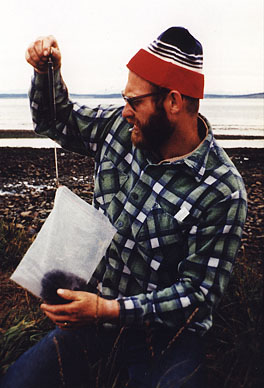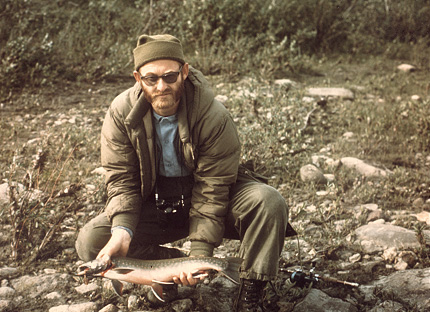Forest Resources Faculty
![[Horizontal Rule Image]](eagleb.gif)
QUICK ACCESS LINKS
EDUCATION:
| Degree |
Date |
University |
Specialty |
B.S.
|
1966
|
Purdue University, West Lafayette
|
Wildlife Conservation
|
M.S.
|
1968
|
University of Montana, Missoula
|
Wildlife Management
|
Ph.D.
|
1972
|
University of California, Los Angeles
|
Zoology
|
University of Washington Institute for Teaching Excellence, Fellow, 2002.
ADMINISTRATIVE ROLES
Wildlife Science Undergraduate program advisor
I serve as an advisor for undergraduate students in the Environmental Science
and Resource Management (wildlife pathway) program. I help them with course
selection and career advice.
College of Forest Resources
I am an active participant in several College and academic division-level committees.
Some of these deal with governance while others deal with academic matters.
Wildlife Society Student Chapter
I serve as the faculty advisor to the Student Chapter of The Wildlife Society
(TWS), a professional society of wildlife biologists and managers. TWS holds
a meeting twice a month when students get together to discuss academic matters,
technical aspects of wildlife biology, plan activities, and listen to invited
speakers. TWS often has field trips to wildlife areas and also assists graduate
students in their research.
Wildlife Science Program Coordinator
I am the over-all Coordinator for both the undergraduate and graduate programs
and faculty in Wildlife Science. One of the primary responsibilities of this
position is to represent these groups in various College or Universtiy committees
and meetings.
Chair, Ecosystem Science Division
From January 2001 to January 2004, I served as Chair of one of the two College's
academic divisions. The division has 14 tenure-track faculty and 14 research
faculty. There is a wide range of academic disciplines represented in the division.
![[Horizontal Rule Image]](birdb.gif)
COURSES CURRENTLY TAUGHT
- Wildlife and
Society (ESC
250)
This is a service course to University students not in biological sciences
or natural resources programs. The course covers basic ecological concepts,
habitats, and case histories showing how people and societies interact with
wildlife. The course is now offered only in the summer.
-
- Introduction
to Wildlife Biology and Conservation (ESC 350)
This course is designed to be the first course in wildlife biology for majors
in wildlife science, forest management and conservation of wildland resources
programs. The course covers basic principles of animal ecology, population
characteristics, approaches to assessing wildlife abundance and conservation
strategie
RESEARCH INTER EST

The good old days in western Montana.
I am interested in many areas of avian ecology and conservation. These include:
- Ecology of forest birds
- Response of bird populations to modern timber-harvesting
- Structural features of coniferous and riparian forests as indicators
of bird species composition and guild development
- Ecology of marine birds
- Bird conservation
However, the majority of my research has been in two areas: (1)seabird ecology
and conservation and (2)the basic ecology of forest birds and their response
to forest management. We now have a good understanding of the basic nature of
bird communities in most natural and managed coniferous forest landscapes but
we need to better understand some individual species responses to environmental
gradients and to forest management. Future research will be directed in these
areas.
REPORTS ON CURRENT PROJECTS
Responses of Forest Wildlife to Modified
Habitats
PREVIOUS RESEARCH
Nearly all the funding we generate in the Wildlife Science Group is directed
toward providing support for graduate students. Consequently, much of my own
research is essentially cooperative efforts with graduate students. For many
years I was active in seabird research in California, Washington and Alaska.
In recent years, I have concentrated on forest bird ecology. I am in the process
of preparing manuscripts from the results of two long-term research projects.
One concerns bird communities in intensively-managed Douglas-fir forests and
the other is on oak woodlands in south-central Washington. I am also concluding
an extensive assessment of the common murre which includes a review of its natural
history, trends in populations, threats to populations and conservation strategies.
This is a study funded by the U.S. Fish and Wildlife Service and involves several
other professionals as co-authors.


Since 1972, I have obtained $1,494,183 in research funding. The specific sources
include the following:
| Public Agencies |
| U.S. Forest Service |
$671,104 |
| U.S. Forest Service/U.S. Army |
203,118 |
| U.S. Fish and Wildlife Service |
250,361 |
| National Oceanic and Atmospheric Administration |
174,499 |
| Washington Dept. of Fish and Wildlife |
106,300 |
| Washington Dept. of Natural Resources |
100,000 |
| National Park Service |
86,935 |
| City of Seattle, Water Dept. |
32,734 |
| City of Seattle, Parks and Recreation |
12,427 |
| National Science Foundation |
7,500 |
| TOTAL |
$1,646,978 |
| Private Organizations |
| Plum Creek Timber Company |
138,771 |
| Welder Wildlife Foundation |
10,000 |
| National Wildlife Federation |
8,000 |
| National Audubon Society |
1,500 |
| TOTAL |
$158,271 |
| GRAND TOTAL |
$1,805,249 |
Return to Quick Access Links
PUBLICATION LINKS
Click personal publications for a list of my
publications by subject area. Research for contracting agencies is often included
in a report for that agency that may or may not be published. Click contract
publications for a list of contract publications by subject area. For a
list of graduate student dissertations and theses by subject area click student
dissertations and theses.
Return to Quick Access Links
![[Horizontal Rule Image]](jeepbgif.gif)
CURRENT RESEARCH
My personal research currently deals with a continuation of studies of birds
in oak woodlands, evaluating the effects of new silvicultural treatments on
birds (U.S. Forest Service DEMO
project) and the restoration of sage grouse to areas of eastern Washington where
it has been extirpated. I have obtained funding for a study on winter birds
of intensively-managed Douglas-fir forests.
![[Trees Image]](qgforest1.gif) I am currently involved in two major projects. The first
one is a U.S. Forest Service funded study called "Demonstration of Ecosystem
Management Options"(DEMO). This study is an experimental one which attempts
to assess the response of vertebrates and plants to different levels of canopy
removal. We have completed two years of pre-harvest bird sampling on 24 sites
using a combination of point counts and spot-mapping. We will now begin the
post-harvest sampling phase. We have just completed a study of the response
of birds to variable-density thinning at Ft. Lewis, Washington.
I am currently involved in two major projects. The first
one is a U.S. Forest Service funded study called "Demonstration of Ecosystem
Management Options"(DEMO). This study is an experimental one which attempts
to assess the response of vertebrates and plants to different levels of canopy
removal. We have completed two years of pre-harvest bird sampling on 24 sites
using a combination of point counts and spot-mapping. We will now begin the
post-harvest sampling phase. We have just completed a study of the response
of birds to variable-density thinning at Ft. Lewis, Washington.
CURRENT GRADUATE STUDENT RESEARCH
1.Relationships among insects, birds and dead or dying trees in green tree
retention sites. Maria Mayrhofer (M.S.).
2. Conservation of the Juan Fernández firecrown (Sephanoides fernandensis):
Characterization of critical nesting habitat. (Erin Hagen) (M.S.).
3. Lead poisoning in wintering trumpeter swans in western Washington. (Mike
Smith) (M.S.)
ADDRESS:
Dr. David A. Manuwal
College of Forest Resources
University of Washington
Box 352100
Seattle, Washington 98195-2100
Telephone: (206) 543-1585; FAX: (206) 685-0790
Email:auklet@u.washington.edu

Revised June 1, 2005

![[Trees Image]](qgforest1.gif) I am currently involved in two major projects. The first
one is a U.S. Forest Service funded study called "Demonstration of Ecosystem
Management Options"(DEMO). This study is an experimental one which attempts
to assess the response of vertebrates and plants to different levels of canopy
removal. We have completed two years of pre-harvest bird sampling on 24 sites
using a combination of point counts and spot-mapping. We will now begin the
post-harvest sampling phase. We have just completed a study of the response
of birds to variable-density thinning at Ft. Lewis, Washington.
I am currently involved in two major projects. The first
one is a U.S. Forest Service funded study called "Demonstration of Ecosystem
Management Options"(DEMO). This study is an experimental one which attempts
to assess the response of vertebrates and plants to different levels of canopy
removal. We have completed two years of pre-harvest bird sampling on 24 sites
using a combination of point counts and spot-mapping. We will now begin the
post-harvest sampling phase. We have just completed a study of the response
of birds to variable-density thinning at Ft. Lewis, Washington.